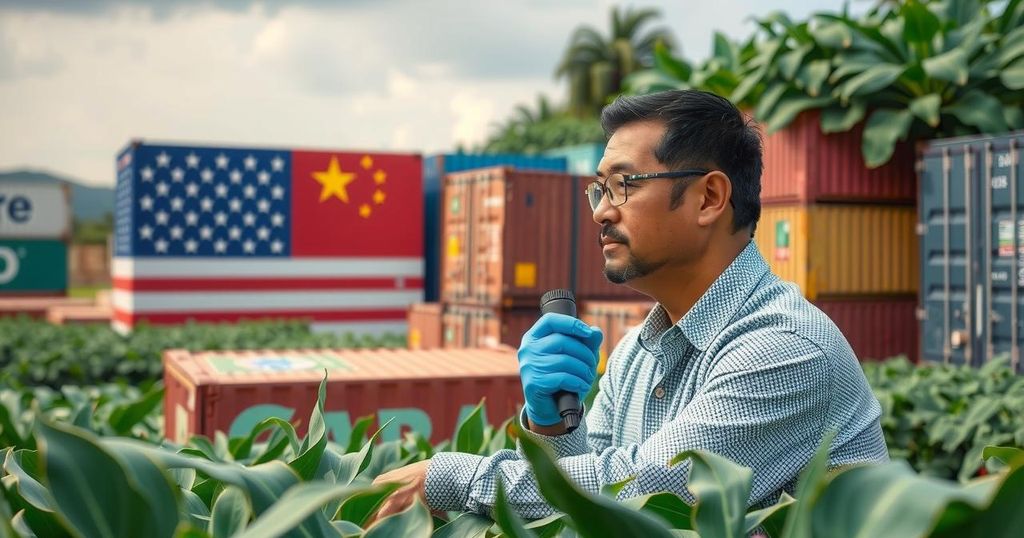The Trump trade war threatens to further damage U.S. agriculture, particularly soybean farmers, as China increasingly turns to Brazil for its supply needs. With prices for crops declining, American producers face challenges from potential tariffs and retaliatory measures. As China diversifies its imports, the competitive landscape shifts, posing risks for U.S. farmers aiming to retain market share. Despite these challenges, agricultural producers anticipate planting without reducing acreage, supported by past government assistance.
The escalation of trade tensions under Donald Trump’s administration is putting significant pressure on American farmers, particularly those producing soybeans. The initial effects of the trade war saw soybean exports to China plummet by 79% over two years. As China diversifies its imports and turns towards Brazil for soybeans, U.S. farmers face a challenging market landscape. Brazil’s increased production capacity has enabled it to meet and exceed demand once fulfilled by American crops, further complicating the outlook for U.S. exporters.
China’s agricultural strategy has evolved since the onset of the trade conflict, with the country stockpiling grains and seeking imports from various international allies, including Brazil for sorghum and cotton from Australia. Farmers across the U.S. have seen declining prices for their crops, prompting concerns regarding potential retaliatory actions from China if tariffs are reinstated. Expected retaliations could disrupt commodities like corn and wheat, jeopardizing the recovery of U.S. agricultural exports.
Despite these challenges, U.S. farmers are determined to maintain production levels, often guided by substantial government support reminiscent of previous trade disputes. Investment in foreign markets, particularly in Brazil, suggests an adaptation strategy to future trade barriers. Therefore, while tensions mount and prospects appear uncertain, American farmers are geared to plant without reducing their acreage, anticipating that U.S. production will still find markets abroad.
The context of the evolving trade relationship between China and the U.S. reveals a fundamental shift in agricultural dynamics. This shift has prompted agronomists and analysts to consider the far-reaching implications of sustained tariffs on U.S. staple crops. Experts, including Citigroup analysts, warn that a new round of tariffs could exacerbate existing supply challenges, as China recalibrates its purchasing strategies amidst an increasingly competitive global market.
The trade war initiated by former President Donald Trump had profound implications for American agriculture, particularly affecting exports of soybeans, which serve as a critical crop for U.S. farmers. Following the initial trade confrontation with China, the U.S. witnessed a dramatic decrease in its soybean market share, as China began sourcing more from Brazil. This article explores the ongoing shifts in trade dynamics, especially as China’s economy adapts to current situations, creating a ripple effect on American farmers’ profitability and the overall agricultural market. With Brazil now emerging as a dominant supplier of commodities that the U.S. once primarily provided, understanding these changes is essential for grasping the future of the U.S. agricultural sector.
In conclusion, the ongoing trade tensions between the United States and China pose significant challenges for American farmers, particularly those in the soybean industry. As China diversifies its suppliers, the impact on U.S. exports is becoming pronounced, with falling prices and a reconfigured market landscape. While U.S. farmers remain committed to maintaining production levels, the risk of renewed tariffs and retaliatory trade measures could further hinder their competitiveness. Attention to the developments in this agricultural trade landscape will be crucial in understanding how U.S. farmers adapt to these complexities.
Original Source: www.detroitnews.com






